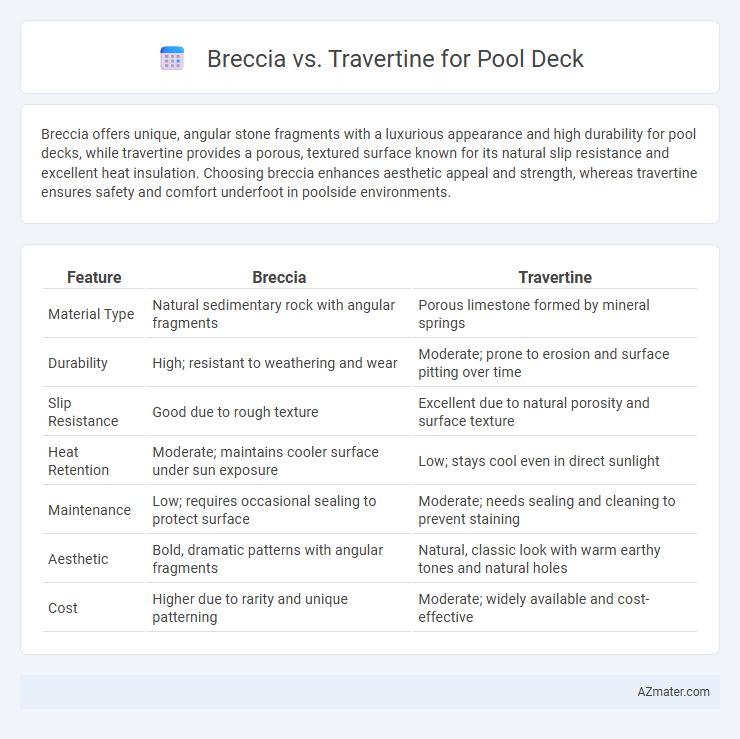Breccia offers unique, angular stone fragments with a luxurious appearance and high durability for pool decks, while travertine provides a porous, textured surface known for its natural slip resistance and excellent heat insulation. Choosing breccia enhances aesthetic appeal and strength, whereas travertine ensures safety and comfort underfoot in poolside environments.
Table of Comparison
| Feature | Breccia | Travertine |
|---|---|---|
| Material Type | Natural sedimentary rock with angular fragments | Porous limestone formed by mineral springs |
| Durability | High; resistant to weathering and wear | Moderate; prone to erosion and surface pitting over time |
| Slip Resistance | Good due to rough texture | Excellent due to natural porosity and surface texture |
| Heat Retention | Moderate; maintains cooler surface under sun exposure | Low; stays cool even in direct sunlight |
| Maintenance | Low; requires occasional sealing to protect surface | Moderate; needs sealing and cleaning to prevent staining |
| Aesthetic | Bold, dramatic patterns with angular fragments | Natural, classic look with warm earthy tones and natural holes |
| Cost | Higher due to rarity and unique patterning | Moderate; widely available and cost-effective |
Introduction to Breccia and Travertine
Breccia is a natural stone characterized by its angular fragments cemented together, offering a unique, highly textured appearance ideal for pool decks seeking a distinct aesthetic. Travertine, a sedimentary limestone formed from mineral springs, features porous surfaces and warm, earthy tones that provide excellent heat resistance and slip resistance for poolside areas. Both stones deliver natural beauty and durability, with Breccia emphasizing bold patterns and Travertine known for its classic, versatile look.
Key Differences Between Breccia and Travertine
Breccia features a distinctive angular, fragmented pattern with a mix of bold colors, offering a dramatic and eye-catching appearance, while Travertine is known for its smooth, porous surface with natural pits and a more uniform, earthy tone that provides a classic, elegant look. Breccia tends to be denser and less porous, making it more resistant to water absorption and staining compared to the more porous Travertine, which may require sealing for durability in pool deck applications. In terms of slip resistance, Travertine's natural texture provides better traction when wet, enhancing safety around pools, whereas Breccia's polished finish can be slick without proper treatment.
Appearance and Aesthetics
Breccia features a striking, fragmented pattern with bold veins and a mix of colors that create a dramatic, luxurious look ideal for pool decks aiming for a unique statement. Travertine offers a more uniform, natural appearance characterized by soft earth tones and subtle textured pitting, giving pool decks an elegant, classic Mediterranean feel. The choice between Breccia and Travertine will heavily influence the pool deck's overall aesthetic, with Breccia delivering high visual impact and Travertine providing timeless, understated beauty.
Durability and Longevity
Breccia offers superior durability for pool decks due to its dense composition and resistance to cracking under heavy foot traffic, making it ideal for long-term use. Travertine, while aesthetically pleasing with its natural porous texture, requires sealing to prevent water absorption and damage from pool chemicals, which can affect its longevity if not maintained properly. Both stones provide longevity but Breccia's hardness and lower porosity ensure enhanced durability and reduced maintenance over time.
Slip Resistance and Safety
Breccia offers enhanced slip resistance for pool decks due to its textured surface and natural veining, reducing the risk of accidents in wet conditions. Travertine, while aesthetically pleasing with its smooth, porous surface, may require additional sealing or surface treatment to improve traction and ensure safety around pools. Selecting Breccia or treated Travertine depends on balancing slip resistance priorities with design preferences for pool deck safety.
Heat Retention and Comfort
Breccia stone offers moderate heat retention, making it comfortable underfoot for pool decks without becoming excessively hot during sunny days. Travertine is renowned for its low heat retention, providing a cool and pleasant surface ideal for barefoot walking near pools. Both materials enhance poolside aesthetics, but travertine's natural porosity and cooler temperature make it the preferred choice for maximizing user comfort.
Maintenance and Cleaning Requirements
Breccia pool decks require regular sealing to protect against stains and weather damage, with routine sweeping and gentle washing to prevent debris buildup. Travertine offers natural durability and requires less frequent sealing but can be susceptible to etching from acidic cleaners, necessitating pH-neutral cleaning solutions. Both materials benefit from prompt removal of dirt and organic matter to maintain their aesthetic appeal and prolong surface integrity.
Cost Comparison
Breccia stone typically costs more than travertine due to its rarity and unique veining, with prices ranging between $15 to $30 per square foot, while travertine generally falls between $10 to $25 per square foot. Installation expenses for both materials are similar, but breccia may require more specialized labor, increasing overall costs. Travertine offers a more budget-friendly option for pool decks without compromising on durability or aesthetic appeal.
Environmental Impact
Breccia and travertine differ significantly in their environmental impact when used for pool decks. Breccia, with its diverse mineral composition, often requires more intensive quarrying processes, resulting in higher energy consumption and habitat disturbance. Travertine, a sedimentary rock formed in mineral-rich spring waters, tends to have a lower environmental footprint due to more sustainable extraction methods and its natural ability to regulate temperature, potentially reducing heat absorption on pool decks.
Which Stone is Best for Your Pool Deck?
Breccia and travertine both offer durable, visually appealing options for pool decks, but breccia stands out for its higher density and superior resistance to water absorption, reducing the risk of cracking and stains. Travertine provides excellent slip resistance and remains cooler underfoot, making it a comfortable choice in hot climates. Choosing between breccia and travertine depends on priorities such as durability, maintenance, and climate conditions surrounding your pool area.

Infographic: Breccia vs Travertine for Pool Deck
 azmater.com
azmater.com